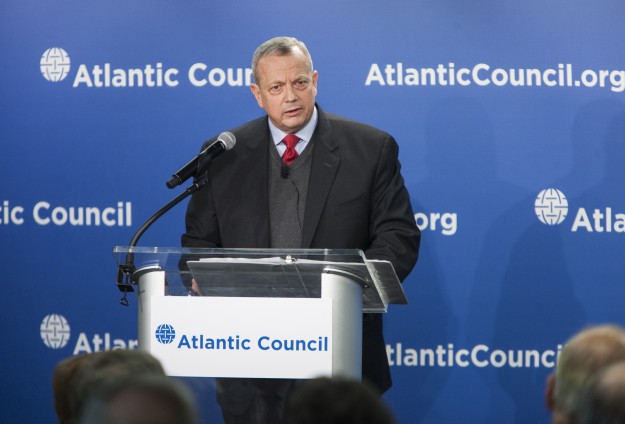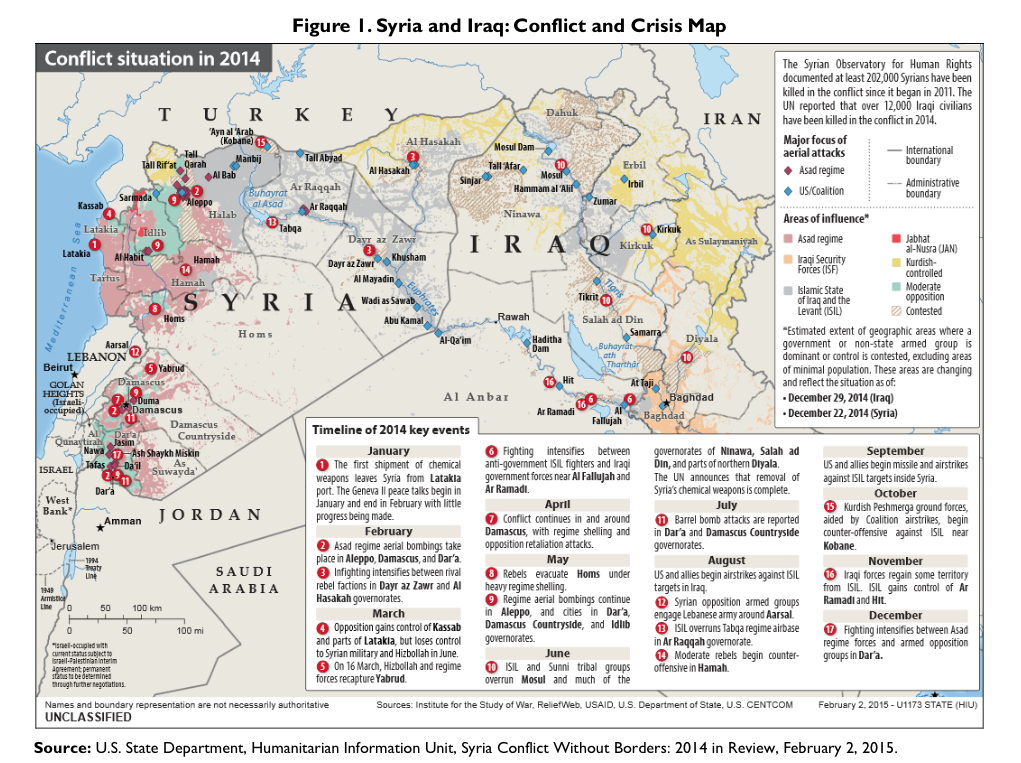
Quoting the Iraqi prime minister that “we’ll do Mosul when we’re ready,” the special presidential envoy to the Global Coalition to Counter ISIL said, “We’ve got to resist putting a timeline on it.”
Speaking on Tuesday at the Atlantic Council in Washington, retired Marine Gen. John Allen said the emphasis in the fight against the Islamic State in Iraq and Syria (ISIS or ISIL) should be “less on the taking” and more on what happens after territory is re-taken. “We need to define success at the outset.”
Allen — the U.S. special envoy to the global collation to counter ISIS — noted that since the coalition was formed less than six months ago, “we’ve blunted” ISIS. Allen cited the fighting at Khobane as the place where the Islamist extremist advance was halted. “ISIL made it strategically important” and the successful defense of the city damaged extremists’ morale even in command circles and a rise in desertions.
Noting the fierce fighting taking place in Tikrit, in al Anbar Province and in the north by Kurdish forces that is putting pressure on ISIS, he said the preparation for the holding force includes planning for the leadership element to go back into that region and tying it to the government, answering what is being done for the liberated population and what will be done for the internally displaced persons returning to their former homes.
“There will be an immediate need for humanitarian relief, maybe humanitarian rescue, medical, food electricity, flow of fresh water. How many people remain and how many are coming home.”

Allen — who also is on the board of directors of the U.S. Naval Institute — added, “The recovery of population [the return of displaced persons] is only now beginning.” He said reports of ISIL’s governance in territory it controls in Iraq and Syria “is trending from negative to horrendous” and that has driven thousands out of their homes and into refugee camps in Iraq, Jordan, and Turkey.
He praised Iraqi prime minister Haider al Abadi for reaching out to the Sunni minority, sealing an agreement with the Kurds on oil sales, passing a budget, and looking to establish provincial national guard forces.
The security forces are overwhelmingly Shi’ia. The regional forces would reflect the ethnic and sectarian character of the province.
“This is a young government at a moment of political turbulence.”
Defeating ISIS “is for Iraq to do” is what Allen said he hears from Abadi who “must walk a relatively narrow political trail” between the Sunnis and the Shi’ia, who make up the majority of Iraq’s population and his political base. Allen said the Iraqis are grateful for the air and logistical support, the training and the equipment they are receiving from the coalition.
Jordan’s King Abdullah II went a step further in saying, “This is a war for the future of Islam.” Allen said that view is shared widely in Islamic countries.
Describing the situation in Syria as “very complicated,” he said, “The moderate Syrian opposition is seriously threatened” by the regime of Bashar al-Assad, ISIS, and other extremist groups. But plans continue to train 5,000 of them each year for three years to created a ground force to take on ISIL in Syria.
Allen said that while the 62 nations in the coalition agree that a political solution is needed in Syria, not all agree with the U.S. position that the Assad regime must go.
He said coalition partners were increasingly concerned about “organizations outside of the original areas of commitment” claiming to be affiliated with ISIS, such as those in Libya who recently beheaded 21 Coptic Christians, or those operating in Egypt’s Sinai Peninsula.
“We’re going to have to watch them closely” because they pose domestic challenges in a number of countries and can be a continuing source of foreign fighters in Iraq and Syria.
He said other ways beyond the military and humanitarian relief the coalition is using to counter ISIS include trying to cut off its financing from oil sales, human and sex trafficking, selling art and historic artifacts and hiding stolen funds or ransom money in foreign banks. It is also developing a counter-messaging strategy.
“ISIL is the current emergency,” and to succeed in the long run the countries in the region have “to create a rising tide of opportunity.”





